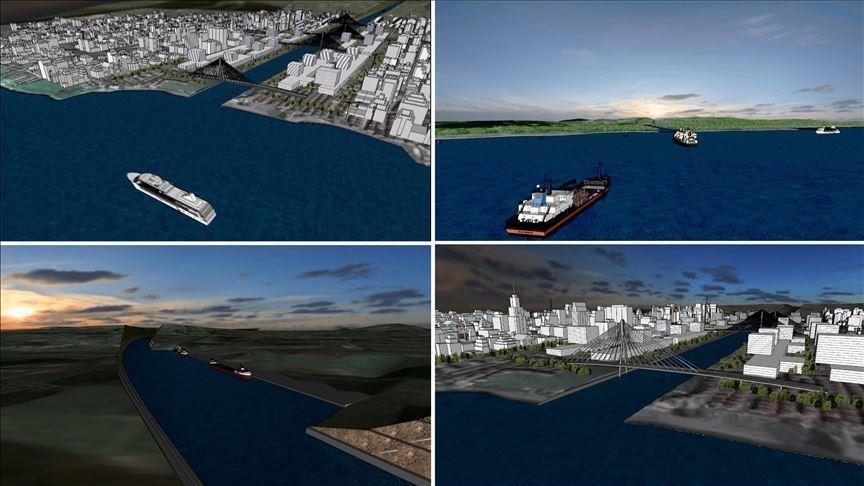Istanbul Canal..a giant project that will benefit Turkey and the world
The Istanbul Canal project represents Turkey's vision for the future
The left government is about to complete the necessary preparations for the project
The tender for the project is expected to be launched this summer
The canal will be 45 km long, 21 meters deep, and 275 meters wide.
- The canal will be earthquake-resistant, will provide many projects for urban transformation, will generate important financial resources, and will create new job opportunities
- The Bosphorus Strait will be transformed into a tourist area, as it is considered the focus of the world due to the beauty of its nature and the historical monuments it contains.
The Bosphorus Strait, which connects the Black Sea and the Sea of ??Marmara in the Turkish city of Istanbul, is one of the most important global water crossings, and throughout history it has been a point of conflict between the major countries of the world.
With the development of global trade movement, and the increase in dependence on maritime transport, a new water crossing was needed to ease the burden on the Bosphorus Strait, which would benefit Turkey and the world.
In this context, and as a result of the security and environmental risks resulting from the increased burdens of ships passing through the strait, the Turkish government has begun preparations to build a water canal on the European side of Istanbul.
Turkish vision
The Turkish Minister of Transport and Infrastructure, Adel Kara Ismailoglu, told Anatolia a few days ago that they are continuing preparations for the tender for the construction of the Istanbul Water Canal, stressing the importance of the canal for Turkey.
He added that the Istanbul Canal "a project that represents Turkey's vision", and that it is one of the largest projects around the world, and pointed to his country's recent approval of the plans to develop the canal, pointing to the completion of the project's architectural preparations.
He explained that preparations are continuing to launch the channel's tender, stressing their intention to start it "very soon", without revealing more details.
According to previous government estimates, the cost of the project is expected to be approximately $25 billion, and the construction will be on the European side of the city, from Lake Buyukcekmece on the Sea of ??Marmara in the south, to the Black Sea in the north.
The cornerstone of summer
Turkish President Recep Tayyip Erdogan said in a speech last Wednesday that his government is about to complete the necessary preparations for the Istanbul Canal project, explaining that the canal will be a new outlet for the region, and it is planned to lay the foundation stone for the project this summer.
Erdogan said that the project was approved by the environment report, and included a study carried out by 56 institutions, and more than 200 scientists participated in the studies, and the study ended with the participation of citizens and field work.
The Turkish government intends to have the project launched and made progress by the year 2023, with the centenary of the founding of the Turkish Republic.
According to Erdogan, the length of the canal is 45 km, its depth is 21 meters, its maximum width is 275 meters, and at the narrowest base the width on the surface will be 360 ??meters.
And he added, "A new city will be built on both sides of the canal, with a capacity of five hundred thousand people. The project will accelerate preparations for facing the threat of earthquakes, and it will be integrated with the rest of the development projects that Istanbul witnessed, including the new airport, the third bridge, new roads and metro lines."
Heavy traffic
Erdogan said in his speech that in 1930, 3,000 ships passed through the Bosphorus in one year, but the number currently exceeds 40,000.
He explained that the Panama Canal witnesses the passage of more than 13,000 ships annually, and the Suez Canal passes through about 17,000 ships annually.
He added that the capacity of the Bosphorus Strait for safe travel is only 25,000 ships annually, and this means that the Bosphorus bears a greater burden.
Intensive scientific study
According to the data of the Ministry of Infrastructure, the Istanbul Canal study was conducted by 7 Turkish universities, one of the best in the country, with the participation of 200 academics, and the studies included 33 different scientific branches.
Measurements were taken that included 97 points in order to protect the environment and excavations of 17,000 meters in 304 different points, including 8 points for groundwater and 17 hydrological study points, through 56 institutions to prepare the environmental report. The tests were conducted in Turkish and French laboratories.
According to the same ministry data, in 2019, the number of ships that crossed the Bosphorus reached 41,112 ships, 30% of which are considered dangerous cargo, and the tonnage of the ships is large, which has increased the weight of the cargo passing through the strait in recent years.
The narrowest width of the Bosporus is 700 meters, and there is a daily movement estimated at two thousand trips between the two banks of the strait in local transport, as well as the presence of surface and underground water currents that raise the risks of collision.
- many benefits
Environmental protection is an important benefit of the Istanbul Water Canal, according to previous government data, since it will reduce the pollution rate caused by the passage of a large number of ships from the heart of Istanbul.
Canal Istanbul will be resistant to earthquakes that threaten the city, will provide many projects for urban transformation, will generate important financial sources, and will create new job opportunities.
The Turkish government is also seeking to turn the Bosphorus Strait into a tourist area, as it is considered the focus of the world's attention due to the beauty of its nature and the historical monuments it contains.


For More Informations Please Fill This Form